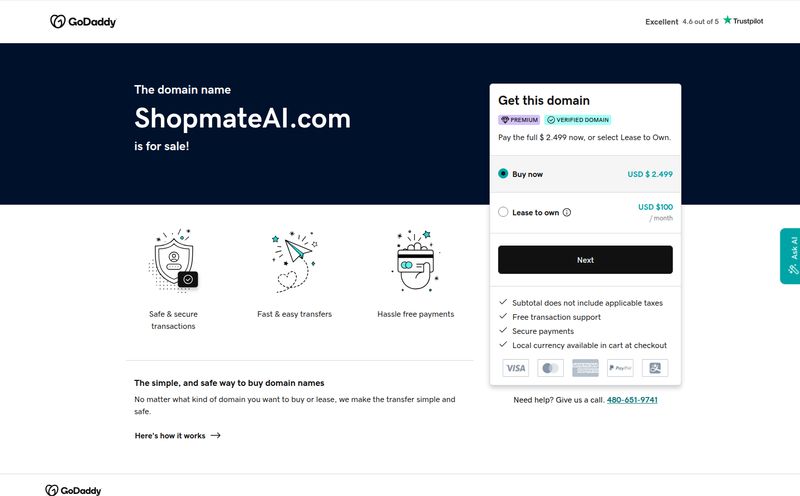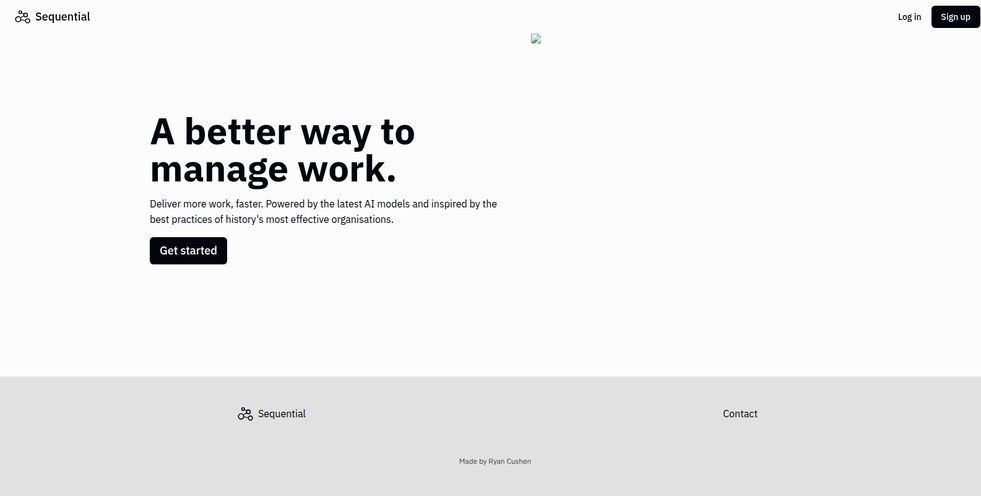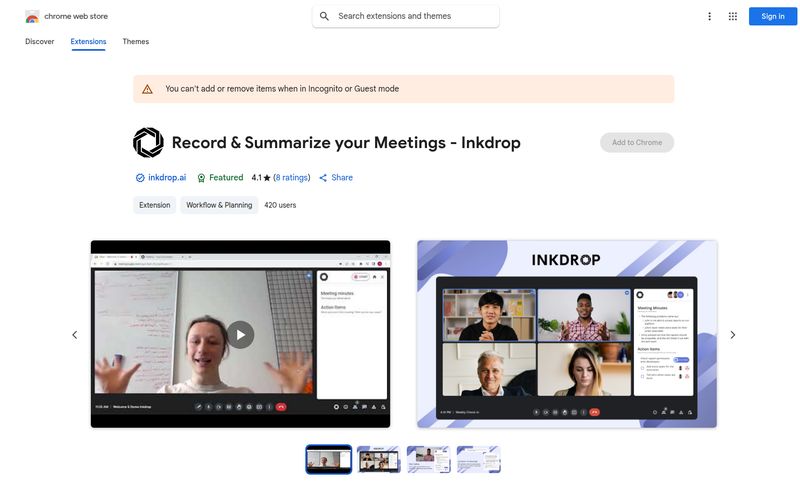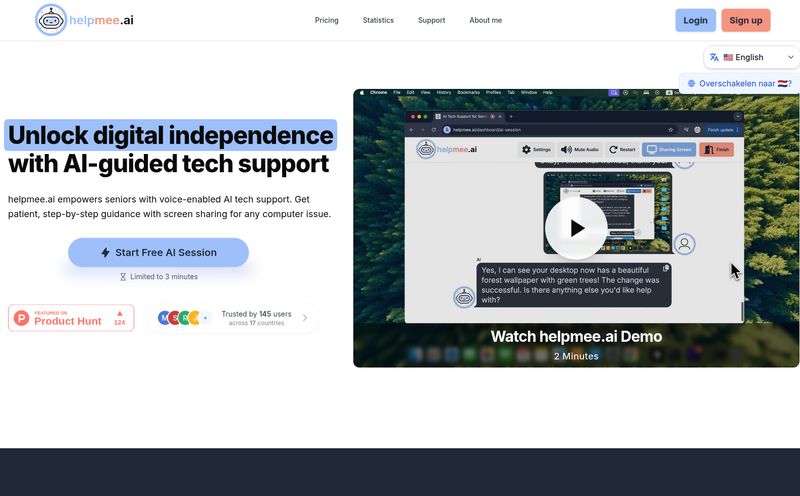Some days, my brain feels like a web browser with 57 tabs open, all playing different YouTube videos at once. There’s the calendar tab, the email tab, the project management tab, the Slack tab… and somewhere in that digital mess, there's the tab for what I’m actually supposed to be doing. It’s a constant, low-grade hum of organizational anxiety. We're all drowning in a sea of notifications and scheduling requests, and I've been on a personal quest for a life raft for years.
Every so often, a new tool pops up on my radar that promises to be that raft. The latest one is called qoop.Ai. It calls itself an AI executive assistant, and the promise is a big one: to automate the tedious parts of your day and give you back your time. But as a veteran of the productivity app wars, I'm naturally skeptical. Is this another shiny object or could it actually be the digital quartermaster my chaotic life needs? Let's take a look.
So, What on Earth is qoop.Ai?
Okay, let's break it down. At its core, qoop.Ai isn't just another scheduling tool like Calendly, though it does handle scheduling. Think of it more like a silent operator working behind the scenes of your digital life. It’s designed to be the connective tissue between the apps you already use every day. You tell it your preferences—how you like to work, when you're available, which meetings are a priority—and it gets to work, interacting between your tools to manage tasks and arrange your calendar.
It’s less of a tool you actively use and more of a digital butler you hire. It's supposed to watch the flow of requests and tasks, intelligently finding the right slots and handling the back-and-forth so you don't have to. The idea of offloading that mental load? Yeah, that got my attention. It’s a pretty exciting concept, moving beyond simple automation into something that feels more like delegation.

Visit qoop.Ai
The Core Features That Actually Matter
A tool can have a million features, but only a few ever really change your workflow. From what I've gathered, qoop.Ai hangs its hat on a few key capabilities.
Effortless Task and Schedule Automation
This is the main event. We’ve all been trapped in the endless email chain of “Does Tuesday at 2 PM work for you?” only to find out that’s 2 PM in a different time zone. It’s maddening. qoop.Ai aims to eliminate that entirely. Based on the rules you set, it can automatically find openings, propose times to people, and get events on the calendar without you lifting a finger. It also offers manual options, so you're not completely handing over the reins if you don't want to. You can still guide the process, which is a nice touch for control freaks like myself.
The Magic of Integration
A tool like this is worthless if it lives on an island. Its entire value proposition rests on its ability to play nice with your existing tech stack. qoop.Ai is built to integrate with your "consumer daily tools." I take this to mean the usual suspects: Google Calendar, Outlook, maybe Slack, and hopefully project management platforms like Asana or Trello. This integration is what allows it to see your whole picture and act intelligently. The information on specific integrations is a bit thin on the ground right now, which is a slight red flag, but the concept is sound. Without this piece, it's just another calendar app.
The Good, The Bad, and The AI
No tool is perfect, especially not in the fast-moving world of AI. It’s all about whether the good outweighs the bad for your specific needs. Here's my breakdown.
The Upsides That Get Me Excited
The most obvious benefit here is time savings. Every minute not spent coordinating schedules is a minute you can spend on deep work, strategy, or just taking a breather. This isn't just about being more productive; it’s about reducing the cognitive friction of a modern workday. I truly believe that the constant context-switching is one of the biggest enemies of quality work. By automating those little administrative fly-bys, you can stay in the zone longer. That increased efficiency is gold. Pure gold.
The Potential Hiccups to Watch For
Alright, let's get real. My optimism is always seasoned with a healthy dose of caution. First off, the platform's effectiveness hinges entirely on you setting it up correctly. It's not a mind reader. If your preferences are vague or your rules are sloppy, it’s going to make a mess. This isn't a plug-and-play solution; it requires a thoughtful initial investment of time to teach the AI how you operate. Some people might find that initial hurdle a bit annoying.
And now for the elephant in the room: privacy. To do its job, you have to give qoop.Ai access to your calendar, your contacts, maybe even your email. You're giving an algorithm the keys to your digital kingdom. For many, that's a terrifying thought. Any company in this space needs to be crystal clear about their data policies, what they're accessing, how it's stored, and who sees it. The current privacy concerns are valid, and I'd need to see a very robust and transparent policy before I'd let it loose on my own accounts.
Let's Talk Money: What's the Price of Sanity?
So, what does this digital liberation cost? That’s the million-dollar question. As of my review, I couldn’t find any public pricing information for qoop.Ai. This isn't uncommon for a platform that might still be in a beta or early-access phase. It’s the classic startup move: get users in, prove the concept, figure out pricing later.
My guess? We'll probably see a tiered subscription model. Maybe a free version with limited automations (a "freemium" play), a prosumer tier for individuals like me, and an enterprise plan for teams. The price will have to be competitive, sitting somewhere in the busy marketplace of productivity tools. For now, we'll have to wait and see. I'd recommend signing up for their waitlist if you're interested, as early adopters often get the best deals.
Is qoop.Ai the Right Assistant for You?
So who is this for? If you're a freelancer juggling multiple clients, a consultant with a packed schedule, or a small business owner who can't afford a human executive assistant, the appeal is obvious. The more complex your schedule, the more value you'll likely get. You're the target market.
If your schedule is pretty straightforward—maybe one or two meetings a week and you handle everything in a single calendar—this might be overkill. It's like buying a cement mixer to bake a single cupcake. You have to have the problem before you need the high-powered solution.
Frequently Asked Questions about qoop.Ai
How is qoop.Ai different from Calendly?
While both handle scheduling, Calendly is primarily a tool for letting others book time with you easily. qoop.Ai aims to be more of a proactive assistant. It works between your existing tools to not just schedule, but also manage and automate tasks based on your defined preferences, acting more like a human assistant would.
What tools can qoop.Ai integrate with?
Specific integration details are still limited. However, for it to be effective, you should expect it to connect with major calendar platforms like Google Calendar and Outlook, and potentially communication tools like Slack and email clients. Always check their official documentation for the most current list.
Is my data safe with qoop.Ai?
This is a major consideration. You will be granting the service access to sensitive information. It is absolutely critical to read their privacy policy and terms of service thoroughly. Look for information on data encryption, access controls, and their policies on data sharing or selling before you commit.
Do I need to be a tech expert to use qoop.Ai?
Probably not a full-blown expert, but you will need to invest some time in the initial setup. The tool's intelligence relies on you clearly defining your preferences and rules. Expect a small learning curve as you teach the AI how you like to work.
Is there a free version of qoop.Ai?
Currently, there is no public information about a free version or specific pricing tiers. It is common for new platforms to offer a trial or a freemium model, but we will have to wait for an official announcement from the company.
My Final Thoughts
So, is qoop.Ai the magic bullet for digital chaos? The jury is still out. The promise is immense. The idea of an AI that doesn't just automate a single task but orchestrates the workflow between my existing tools is… well, it’s exactly what I've been looking for. It could be a genuine game-changer for reclaiming focus and mental energy.
However, the success of this tool will live or die on three things: the depth of its integrations, the transparency of its data privacy policies, and the intelligence of its AI. If it can nail all three, qoop.Ai could become an indispensable part of my toolkit. For now, I'm marking it as 'cautiously optimistic' and keeping a very close eye on its development. It's a space worth watching.
Reference and Sources
- Official Website: Based on available information, assumed to be at
qoop.ai. - Krasadakis, G. (2023). 'The Rise of AI Personal Assistants'. TechCrunch. - A great overview of the current landscape of AI assistant technology.
- Newman, L. H. (2022). 'How to Protect Your Data From Your Own Apps'. Wired. - An insightful read on the privacy implications of app integrations.



